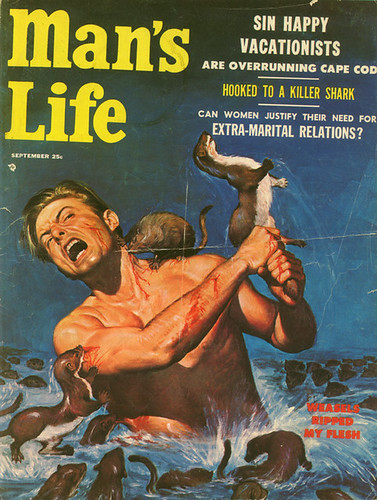Some art unquestionably makes the world a better place in which to live. As an example, I give you these two pieces by painter and author Harland Miller:
Tuesday, July 31, 2007
Thursday, July 26, 2007
To Lead, Not To Read
Well, I saw The Simpsons Movie last night, and the verdict is............it's OK.
It basically is an extended episode, and in some ways that's a disappointment. They don't do what I thought they probably would, which is have lots of jokes about it being a film, and lots of star cameos. Perhaps that's a good thing.
At 90 minutes long, it also felt a touch short - another 15 minutes or so might have made it feel a little more meaty.
All that said, it was funny enough, and it was interesting watching the Simpsons with a big crowd - you get to see all the diferent types of audience the show has, and the different types of joke they laugh at.
However, it's hard to escape the feeling that the Simpsons is finally reaching the end of its run.
It basically is an extended episode, and in some ways that's a disappointment. They don't do what I thought they probably would, which is have lots of jokes about it being a film, and lots of star cameos. Perhaps that's a good thing.
At 90 minutes long, it also felt a touch short - another 15 minutes or so might have made it feel a little more meaty.
All that said, it was funny enough, and it was interesting watching the Simpsons with a big crowd - you get to see all the diferent types of audience the show has, and the different types of joke they laugh at.
However, it's hard to escape the feeling that the Simpsons is finally reaching the end of its run.
Monday, July 16, 2007
WEASELS RIPPED MY FLESH!
The cover of the September 1956 issue of "Man's Life" magazine.
There isn't an element of that cover that isn't brilliant in one way or another. If I had any talent as an artist, I'd render incidents from my own life in the same style.
Friday, July 06, 2007
Normal Service Is Resumed
OK, back to the normal pop-culture references. Over at The Simpsons Movie Site they have a character generator which you can use to make a Simpsons version of yourself. Here's how I might look in the Simpsons world:
It's not a terrible likeness, if I do say so myself.
It's not a terrible likeness, if I do say so myself.
Wednesday, July 04, 2007
Coming Soon
As it's now up on the website, I think it's appropriate to publish the abstract for the session I'm co-organising at the TAG 2007 conference. We're after papers for it, if anyone's interested.
Chance, Choice, and Catastrophe: An Archaeology of the Unpredictable
Archaeologists, regardless of their ideological stripe, have a tendency to look for recognisable patterns in the archaeological record. In many ways this is unsurprising, given archaeology’s origins as part of the Modernist project (Thomas, 2004), and the manner in which the western world is emerging from a period characterised by the two competing determinist schools of thought provided by Marxism and Free-Market economics (Ferguson, 1997). The question must be raised, however, as to how well archaeology deals with the random unpredictable event.
This is particularly relevant in light of recent scientific developments such as non-linear systems theory, which implies that the unpredictable is in fact a highly relevant factor in any complex system, which human culture certainly is. Such developments create a tension between the paradigms of the unpredictable event and gradual development, and those of individual agency and group dynamics. This session will therefore seek to present papers analysing the role of the unpredictable in archaeology, and how archaeology may incorporate such thinking into its work.
References
Ferguson, N. 1997. “Virtual History: Towards a ‘chaotic’ theory of the past”, in N. Ferguson (ed.) Virtual History: Alternatives and Counterfactuals. 1-90. London: Papermac.
Thomas, J. 2004. Archaeology and Modernity. London: Routledge.
Chance, Choice, and Catastrophe: An Archaeology of the Unpredictable
Stephen O’Brien, David Smith, Helen Murphy (University of Liverpool)
Archaeologists, regardless of their ideological stripe, have a tendency to look for recognisable patterns in the archaeological record. In many ways this is unsurprising, given archaeology’s origins as part of the Modernist project (Thomas, 2004), and the manner in which the western world is emerging from a period characterised by the two competing determinist schools of thought provided by Marxism and Free-Market economics (Ferguson, 1997). The question must be raised, however, as to how well archaeology deals with the random unpredictable event.
This is particularly relevant in light of recent scientific developments such as non-linear systems theory, which implies that the unpredictable is in fact a highly relevant factor in any complex system, which human culture certainly is. Such developments create a tension between the paradigms of the unpredictable event and gradual development, and those of individual agency and group dynamics. This session will therefore seek to present papers analysing the role of the unpredictable in archaeology, and how archaeology may incorporate such thinking into its work.
References
Ferguson, N. 1997. “Virtual History: Towards a ‘chaotic’ theory of the past”, in N. Ferguson (ed.) Virtual History: Alternatives and Counterfactuals. 1-90. London: Papermac.
Thomas, J. 2004. Archaeology and Modernity. London: Routledge.
Subscribe to:
Posts (Atom)

